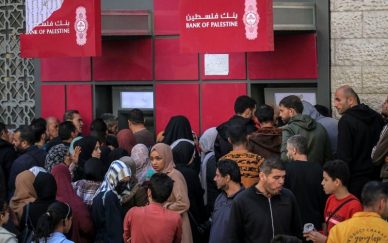GAZA, (PIC)
The World Health Organization estimates that there are around 52,000 pregnant women in the Gaza Strip, and the organization states that they are at risk due to the collapse of the healthcare system amidst the ongoing war in the region. Concerns extend beyond childbirth itself to several challenges, such as keeping children alive amid deprivation of basic needs like water and food.
The catastrophic conditions and widespread death instill fear in the hearts of pregnant women, including Malak Shabat (21 years old), who fled to the city of Rafah in southern Gaza after being displaced multiple times from one area to another to escape Israeli airstrikes. Malak, who is nearing her due date and living in a tent, says, “I am very afraid of giving birth in this place.”
In another case, Asmaa Ahmed (31 years old) was forced to flee her home in northern Gaza due to Israeli bombing, then sought refuge in a shelter in Gaza City, where she gave birth to her child in the middle of the night amidst power cuts.
The doctor overseeing her delivery used the light from a cell phone and cut the umbilical cord with a multi-purpose scissors, and then the baby was born safely.
Asmaa recalls her fears during childbirth, saying, “I was very afraid of losing my child, I told myself that I would die.”
The nurse, Baraa Jaber, who assisted in her delivery, says, “It was very late, and the (Israeli) occupation was bombing anyone who moved, and we couldn’t transfer her to the hospital.”
Street deliveries
Last month, the United Nations announced that only 12 hospitals remain operational out of 36 hospitals that were functioning before the Israeli aggression on Gaza. The Emirati Maternity Hospital in Rafah now has only 5 delivery rooms left. There are around 1.5 million people displaced in the city of Rafah.
The United Nations added that the restrictions imposed by Israel have led to the cessation of most aid convoys. The United Nations Population Fund pointed out that 62 aid packages containing materials for childbirth are waiting for permission to enter through the Rafah crossing.
Samaah El-Halou was in her last month of pregnancy when she reached Rafah, where she struggled to obtain the care she needed. Samaah says, “They told me that I would need a simple surgery during childbirth, but the surgery was delayed for two weeks; there were no doctors, no beds, and no operating rooms.”
Later, Samaah gave birth to her son Mohammed, but she couldn’t stay in the hospital as doctors discharged her with her child to make room for emergency childbirth cases, as there was not enough space for everyone. Samaah says, “I returned to the tent in the Mawassi area in Rafah, where it was very cold, and I was also suffering severe pain, and then I felt that I would lose my son.” She added, “Our life here in the tent is harsh, worse than hell.”
The French doctor, Raphaël Petit, who was on a mission in southern Gaza, says that quickly leaving the hospital is routine, as when women give birth, their families come to take them, noting that the hospital cannot schedule follow-ups because many people visit it.
Some women were asked to bring mattresses and blankets if they wanted to stay in the hospital after childbirth. Other women were forced to give birth outside hospitals or on the streets.
Nightmare
The danger is not limited to women nearing childbirth, but all pregnant women are at risk due to food shortages during the war. According to UNICEF, 95% of pregnant or lactating women face severe malnutrition.
The United Nations Population Fund warned in its report last month that the spread of unhealthy toilets leads to widespread dangerous urinary tract infections.
Since the outbreak of the war, Ruaa El-Sandawi, pregnant with triplets, has been suffering from dizziness due to eating canned food that affects iron absorption, according to her doctor.
Ruaa (20 years old) says, “I had to resort to food distribution centers, where they provide beans, lentils, and pasta.” She adds, “I was able to eat this food for a week, but then my stomach couldn’t handle it, and I got tired.”
The suffering of women in Gaza continues as the International Women’s Day approaches on Friday, March 8th. UNFPA representative in the Palestinian territories, Dominique Allan, says, “There are many crises in the region that are catastrophic for pregnant women, and due to the population density in Gaza and the absence of safe places, the situation has become ‘worse than our worst nightmares’.”















